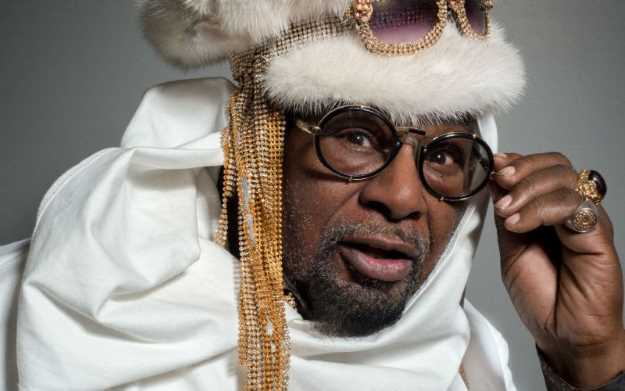| |
Taken from Nashville Scene (July 25, 2019)
George Clinton Has Given Us the Funk, and a Whole Lot More
Looking at the visionary artist's long and winding career ahead of his show at Municipal Auditorium
by Ron Wynn

Photo: William Thoren |
Only a select few artists merit being described as visionaries. These are individuals whose influence extends far beyond the landscape of chart appearances or radio exposure and into the realm of genuine, long-lasting cultural significance. George Clinton belongs on that list.
As an innovator, he's been as distinctive and original a force within the sphere of popular music as Sun Ra, Miles Davis or Duke Ellington were in jazz. In the 1970s, Clinton's influence as a songwriter, producer, touring performer and style icon began to extend well beyond the idiom he's most famous for, and that continues into the present day. Besides becoming a pop culture presence tapped for appearances in film, television and video games (running the gamut from House Party to The Tracey Ullman Show to Grand Theft Auto), his music became the foundation of the West Coast hip-hop style pioneered by Dr. Dre that eventually became known as G-funk. The lengthy list of rap acts who've funneled Clinton's material into their songs covers a wide range: Tupac, Ice Cube, OutKast, Redman, the Wu-Tang Clan - the list goes on.
Clinton, who turned 78 on July 22, made a lot of headlines by declaring that his current One Nation Under a Groove Tour - which brings Clinton, his long-running and evolving group Parliament-Funkadelic and more to Nashville's Municipal Auditorium on Friday - would mark his retirement from touring. But lately, he's been suggesting it might not be the case. In May, he told The Philadelphia Tribune that he has plans to stay on the road at least into 2020, partly due to unresolved legal problems. As he said: "Maybe next year I'll be ready to take it easy. But I still enjoy what I do." Even though Clinton's story isn't over yet, the legacy of the revered multiple-award winner and his creative partners is awesome and unprecedented.
Clinton, a North Carolina native who grew up in New Jersey, has musical roots reaching back to the doo-wop era, and he spent time early in his career as a staff songwriter at Motown. But he had much loftier ideas than fronting a singing group or penning occasional smashes for various bands. Clinton's idea from the start of his first group The Parliaments was to have an ensemble whose tunes and performances reflected not only the broadest aspects of black music, but other entertainment genres such as science fiction. He soon realized he'd need a second unit to perform more ambitious, edgy material that wasn't strictly soul-oriented, so he spun off Funkadelic, a group that initially had been the backing band for The Parliaments. The group's roster included virtuoso instrumentalists like guitarists Garry Shider and Glen Goins, bassist Cordell "Boogie" Mosson and keyboardist Bernie Worrell.
Parliament-Funkadelic, an amalgam of the two groups, became a laboratory for Clinton in which he expanded his musical vision and ideas. P-Funk's records deliver social commentary from an Afrofuturist universe populated by oddball characters like the hero Star Child and the villain Sir Nose d'Voidoffunk. Clinton was so inventive that two groups weren't enough to record all his material. Among many others, the groups in Clinton/P-Funk orbit have included The Brides of Funkenstein, The Horny Horns, Bootsy's Rubber Band and Parlet. The '70s were an especially prolific period for these groups, with multiple Top 40 hit singles on the Billboard R&B charts and platinum LPs including 1975's Mothership Connection and 1977's Funkentelechy vs. the Placebo Syndrome (both credited to Parliament), along with such massively influential LPs as Maggot Brain and One Nation Under a Groove (both Funkadelic releases).
These bands contained both great musicians who were Clinton associates and others he recruited from James Brown's groups, like saxophonist Maceo Parker, trombonist Fred Wesley and bassist Bootsy Collins. They were equally adept at cutting short, quick-hitting numbers as they were with sprawling, heavily improvised set pieces. Their stage shows included enough props, outlandish costumes and gimmicks - including the landing of a massive spacecraft set piece called The Mothership - to keep the attention of even the toughest-to-impress concertgoer. The studio results were a series of masterpiece releases that not only expanded the conceptual borders for funk recordings, but also showcased Clinton's versatility as a songwriter and humorist, the latter being an area that has become even more prominent in subsequent decades.
From the 1980s into the present, Clinton has remained nearly as busy, with both solo projects and different iterations of Parliament-Funkadelic. All the same, legal battles have consistently played a role in Clinton's career ever since. One notable conflict began in the early '80s with PolyGram, which acquired Casablanca Records, a label that owned many of Clinton & Co.'s early records. Another began in the 1990s with Bridgeport Music Inc., a company that claims ownership of the copyright in large portions of Clinton's catalog. All the same, Clinton has increasingly become the voice of experience and wisdom, counseling other groups and acts, while still making periodic guest appearances and releases in addition to his own records, which have been released on many labels, from Prince's Paisley Park to his own C Kunspyruhzy.
Clinton seems happy to spend time in the studio: In 2018, there was a new Parliament release, Medicaid Fraud Dogg, and Clinton appears on Flying Lotus' recent LP Flamagra. Even if Clinton never has another chart hit, nothing can diminish his staggering output and unquestionable impact. Whenever he does permanently cease touring, it will mark the retirement of a titan in American music.
|
|